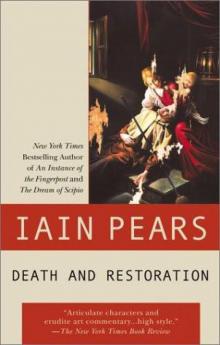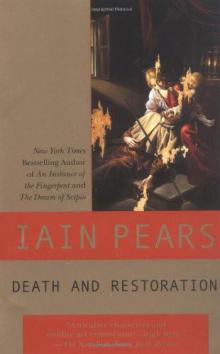- Home
- Iain Pears
The Dream of Scipio
The Dream of Scipio Read online
Table of Contents
Title Page
Copyright Page
Dedication
PART ONE
PART TWO
PART THREE
CHRONOLOGY
Acknowledgements
About the Author
Praise for The Dream of Scipio
Chosen as one of the
New York Public Library’s Books to Remember
for 2002
—Los Angeles Times
“The Dream of Scipio is not a mystery story. But it is a mysterious book, plumbing the shifting motives and passions of its perplexed characters and tracking the startling trajectories of ideas over the course of centuries. . . . Pears weaves back and forth, making it easier for the reader to grasp their parallels, contrasts and ironies. His novel is roughly in the tradition of Umberto Eco’s The Name of the Rose, but it has more passion and urgency than Mr. Eco’s lighter, more playful work. The Dream of Scipio is complex, surprising and thought-provoking, a dream of a novel in more senses than one.”
—The Wall Street Journal
—The Daily Telegraph (London)
—New York Daily News
—Kirkus Reviews (starred review)
“Iain Pears is back, and once again, he’s full of philosophy, history and well-crafted plot. . . . An enormously accomplished work that stands as a learned novel of ideas, a meditation on history and a moving love story, all rolled into one volume. . . . This tandem of thought-provoking ideas and dramatic human situations makes The Dream of Scipio a worthy successor to Fingerpost.” —BookPage
—The Edmonton Journal
“Combine[es] the visceral pleasure of a thriller with the more intellectual excitements of a novel of ideas. . . . Beautifully constructed and, for such a cerebrally challenging book, remarkably easy to read. . . . It is never less than engrossing.” —The Sunday Telegraph (London)
—Independent on Sunday (London)
—Montreal Gazette
Praise for An Instance of the Fingerpost
A New York Times Bestseller
A New York Times Notable Book
Named one of the New York Public Library’s
Books to Remember from 1998
—The Sunday Boston Globe
—The Washington Post Book World
—Houston Chronicle
“A rollicking murder mystery . . . elegant, accessible, and tinted with delicate humor . . . it is unlikely you will be able to guess whodunit.”
—The Boston Globe
—The Atlantic Monthly
—Milwaukee Journal Sentinel
—San Antonio Express News
—The Philadelphia Inquirer
ALSO BY IAIN PEARS
An Instance of the Fingerpost
Riverhead Books
Published by The Berkley Publishing Group
A division of Penguin Group (USA) Inc.
375 Hudson Street
New York, New York 10014
This is a work of fiction. Names, characters, places, and incidents either are the product of the
author’s imagination or are used fictitiously, and any resemblance to actual persons, living or
dead, business establishments, events, or locales is entirely coincidental.
Copyright © 2002 by Ian Pears
All rights reserved.
This book, or parts thereof, may not be reproduced in any form without permission.
The scanning, uploading, and distribution of this book via the Internet or via any other means
without permission of the publisher is illegal and punishable by law. Please purchase only
authorized electronic editions, and do not participate in or encourage electronic piracy of
copyrighted materials. Your support of the author’s rights is appreciated.
eISBN : 978-1-573-22986-9
Pears, Iain.
The dream of Scipio / Iain Pears.
p. cm.
I. Title
PR6066.E167 D
823’.914—dc21
http://us.penguingroup.com
TO MY FATHER
PART ONE
JULIEN BARNEUVE died at 3:28 on the afternoon of August 18, 1943. It had taken him twenty-three minutes exactly to die, the time between the fire starting and his last breath being sucked into his scorched lungs. He had not known his life was going to end that day, although he suspected it might happen.
It was a brutal fire, which took hold swiftly and spread rapidly. From the moment it started Julien knew it would never be brought under control, that he would be consumed along with everything around. He didn’t struggle, didn’t try to escape; it could not be done.
The fire ravaged the house—his mother’s old house, where he had always felt most at ease, and where he always thought he had done his best work. He couldn’t blame those nearby; any sort of rescue would have been foolhardy. Besides, he wanted no assistance and was content with the privacy they had granted him. Eight minutes between the fire starting and his collapsing into unconsciousness from the smoke. Another three minutes before the fire reached him and began to make his clothes smoke and skin bubble. Twenty-three minutes in all until his heart gave out, his breath stopped. Another hour until the fire finally burned itself out and the last charred rafters crashed to the floor over his body. But to Barneuve, as his thoughts broke into pieces and he stopped trying to hold them together, it seemed to have taken very much longer than that.
IN SOME WAYS, his fate was sealed the moment Olivier de Noyen first cast eyes on the woman he was to immortalize in his poems by the church of Saint Agricole a few hundred meters from the Pope’s new palace in Avignon. Olivier was twenty-six, having been fated to live and die in what was possibly the darkest century in European history, an age men called cursed, and which drove many all but insane with despair at God’s vengeance for their sins. Olivier, it was said, was one such.
Isabelle de Fréjus had just turned sixteen and had been a wife for seven months, but was not yet pregnant, a fact that was already causing old women to gossip knowingly, and to make her husband angry. For her own part she was not displeased, as she was in no great rush to embark on the great gamble that left so many women dead or permanently afflicted. She had seen in her mother the terrible damage caused by her own birth, so swiftly followed by another and another, and was afraid. She did her duty by her husband, and prayed every night (after she had taken such precautionary measures as she knew) that her husband’s assaults would prove fruitless for a while longer. Every second day she went to church to beg forgiveness for her unruly, rebellious wishes, and at the same time to place herself at the disposition of the Virgin in the hope that Her mercy and forbearance would endure a while longer.
The effort involved in this celestial balancing act required such concentration that she left the church in a haze of thought, her brow furrowed and showing off a little wrinkle just above her nose. Her veil was ever so slightly disarranged, as she had pushed it back a little when she knelt down to pray. Her maid, Marie, would ordinarily have reminded her of this small lapse, but knew her mistress well, and knew too what was going through her mind. It had been Marie, in fact, who had taught her those little tricks that were helping to make Isabelle’s husband so increasingly concerned.
A small wrinkle and a veil askew were perhaps enough to inspire a painter, but not in themselves sufficient to have such a devastating effect on a man’s soul, so some other explanation must be sought. For Olivier, standing nearby, felt as though some immensely powerful beast had torn at his breast, sucking the very life from him. He gasped in shock, but fortunately no one heard him. So intense was the sentiment, that he had to sit down on the steps and remain there, staring long after the receding fo
rm had disappeared from view. And when he stood up, his legs shaking, his brow damp with sweat even though it was still morning and not yet hot, he knew that his life had changed forever. He did no work for days.
Thus began a tale of the doomed love between a poet and a young girl that was to lead to such a calamitous and cruel ending.
For Olivier was tainted with madness, it seemed; the story recounted how the girl had wished to go with her husband to flee the plague and the poet begged her to stay in Avignon, that they might die in each other’s arms. And when she refused, he killed her, unable to let her go. The deed revealed his secret, and he was set upon by the Comte de Fréjus’s hirelings in revenge, beaten, and his tongue and hands cut off. Olivier was, quite literally, silenced, his voice forever quieted. He could no longer talk, write, or even make signs so that others could understand him well. More still, the outraged and humiliated husband had destroyed all but a few of his poems. No one could now tell whether his poetry, for which he was beginning to become known, was indeed the first flowering of a literary Renaissance, the model beside which Petrarch ranked a lowly second, or merely appeared so to those few who had read his work during his life. Only a dozen or so remained, not enough to captivate a man like Barneuve until he came across some documents in the Vatican library on a cold day in February 1926 while going through the papers of Cardinal Annibaldus di Ceccani, a collector of manuscripts and the poet’s first—and only—patron.
It was the first section of a twenty-page manuscript in Olivier’s hand that kept Julien awake at night in excitement, when he finally made the connection and understood its importance. “According to Manlius.” A brief sentence that meant nothing to most people, but all the world to him. In a moment of jest he said it was worth selling his soul for.
What he dictated, what so excited Barneuve, was a digest of philosophy, cut down and reduced to its essentials for dissemination among his circle and perhaps, should opinion be favorable, beyond that. Few now had any familiarity with such matters and must drink their wine watered to make it palatable. After it had been read, and if it was found suitable, he might pay a copyist for up to a hundred versions—perhaps fifty would now be more than sufficient—which he would send throughout Gaul, to his friends.
Manlius was a host that evening; as he worked, the sun set so gently, leaving a rosy hue in the sky, and the first hints of cooling air began to blow through the open courtyard that was used as a dining room in summer. A few of the party outside began composing verses to amuse themselves and show off their learning. It used to be a regular occurrence amongst them; for Manlius had always surrounded himself with the cultivated, the men of learning whom he understood and who understood him. He had done so all his life; it was his duty and often his pleasure, especially when he could patronize the worthy, or give entertainment to friends of equal rank.
Courtesy required that he play the part of the charming host at dinner as he had done countless times in his past, and he did his duty, even though he had little taste for it that evening. He conformed, as always, to the wisdom of Varro, that the number of guests should be more than the Graces and less than the Muses; he took trouble to ensure they were neither too eloquent, nor yet too silent; discreetly directed the conversation so that, although not trivial, it was not too ponderous, with readings to match. And he accomplished with ease that most delicate task of being free from meanness in his provision of food, without trying to impress his guests with its expense.
Despite his efforts, though, it was not a happy occasion, as it was becoming increasingly hard to assemble even a small group of like-minded spirits. Half the guests were clients, dependent on his favor and keen to eat the dishes of larks and partridges, carp and trout he had ordered, but too ill at ease in such illustrious surroundings to make easy conversation. His adopted son, Syagrius, watching carefully, fearful of making a mistake or saying the wrong thing, ate clumsily, blushing with embarrassment, and said nothing. There were two true friends, Lucontius and Felix, who tried to make things easier, but instead ended up dominating the conversation, interrupting when others tried to speak, being unnecessarily contemptuous of the clients and overly familiar with Manlius himself. And then there was Caius Valerius, a cousin of Felix’s whom Manlius tolerated only because of his friend; he was a coarse man who wrapped himself in piety like a suffocating blanket, which only partly concealed his ill humor and vulgarity.
The three friends set the tone, swapping verse and epigram in the manner of the golden age, bathing themselves in the meters and resonances of the great authors they had revered since they had been schoolboys. It was Lucontius who introduced the lapse in taste—rare for him—that made the evening so much less than agreeable.
Yet now the breath of the Academy
blow the winds of the church of Christ.
But Caius Valerius turned dark with anger. “I consider there are some things at least which should be above jest.”
“Was I jesting?” responded Lucontius in mock surprise, for he realized that Caius was slow-witted enough to be unable to distinguish between respect and mockery. “Surely I speak only the truth? Surely we see the Revelations of Our Lord solely through Greek eyes? Even Saint Paul was a Platonist.”
“I do not know what you mean,” Caius replied. “The truth is told to me in the Bible. I need no Greek words to tell me what I see there.”
Should Manlius intervene, explain how there are many ways of understanding even a simple passage? Teach him how such mysteries as the Incarnation, the Trinity, the Holy Spirit were given shape in our minds through the teaching of the Academies? Caius was one of those who gloried in his ignorance, called his lack of letters purity, scorned any subtlety of thought or expression. A man for his time, indeed. Once, and not so long ago, he would have fallen silent in embarrassment at his lack of knowledge; now it was the knowledgeable who had to mind their tongues.
“And you must remember, dear Lucontius,” Manlius interrupted, “that there are many who consider that Plato had access to the wisdom of Moses, that he merely translated Our Lord’s wisdom into Greek, not the other way around.” He looked anxiously, and saw that Lucontius, dear sensitive soul, took the warning, flashing a brief apology with his eyes. The moment of difficulty was over; the dinner continued, harmlessly and without point.
Except that Manlius was discomfited. He took care in his invitations, actively sought to exclude from his circle crude and vulgar men like Caius Valerius. But they were all around; it was Manlius who lived in a dream world, and his bubble of civility was becoming smaller and smaller. Caius Valerius, powerful member of a powerful family, had never even heard of Plato. A hundred, even fifty years before, such an absurdity would have been inconceivable. Now it was surprising if such a man did know anything of philosophy, and even if it was explained, he would not wish to understand.
Manlius thought greatly of such matters after most of the guests had gone to their beds, escorted by servants with torches. He stared out of the great doors at the landscape beyond, once a park of perfection, now disfigured by the rough cottages of farmers whose dwellings were coming ever closer, huddling nearer his huge villa for protection like piglets around a sow. He could have razed them, but feared their inhabitants might take themselves off, go and find a new lord to protect them—one who would not honor the law if he demanded them back. Then he looked the other way, to the bathhouse now abandoned and turned into a barracks for the soldiers permanently needed to protect the estate.
All they wanted was to live in security, and all the harm they did was to spoil his view. A man like Caius Valerius was very much more dangerous.
“None of us truly chooses our family, I’m afraid.” It was Felix who had walked up quietly behind him. “People like my dear cousin have always existed; even Vergil, I believe, had a brother-in-law who despised his poetry.”
Manlius put his arm around him, and they walked slowly in the fading light. Of all the creatures in the world, Felix was the one he truly loved, w
hose company made him relax and forget his cares. For years now, decades even, he had relied on this short, powerful man, whose mind was as quick as his frame was bulky. A deceptive man, for he looked as he was—a soldier, used to the hardships of fighting and the simplicities of armies. Yet at the same time, he was supple in argument, quick in understanding, and the most honorable, loyal friend Manlius had ever encountered. Nor did he ever condemn; while Manlius frequently heard himself making waspish comments about others, Felix never judged, always sought to see the good even in those who had so little virtue in them.
“I know,” Manlius replied. “And I tolerate him for your sake. But, truly it is a hard job.”
“Rude, vulgar, and scarcely lettered. I know. But a great donor to the church and someone who has dispatched men from his own estates to help defend Clermont from the Goths. As have I.”
“But I haven’t, even though Sidonius is one of my oldest friends? Is that how you wish to end your sentence?” Manlius added.
It had been preying on his mind greatly in the past few months. The city of Clermont, far to the west, was under siege from King Euric, blocking his desire to grab a stranglehold on the whole of Provence. If it fell, they would all soon follow, and it could not last long without reinforcements; indeed it might already have fallen had it not been for Sidonius, who had put himself at the head of the defenses and was refusing to accept the inevitable.

 The Dream of Scipio
The Dream of Scipio Stone's Fall
Stone's Fall The Last Judgement
The Last Judgement An Instance of the Fingerpost
An Instance of the Fingerpost The Bernini Bust
The Bernini Bust Arcadia
Arcadia Death and Restoration
Death and Restoration The Raphael Affair
The Raphael Affair The Titian Committee
The Titian Committee The Immaculate Deception
The Immaculate Deception Giotto's hand
Giotto's hand The Portrait
The Portrait The Bernini Bust ja-3
The Bernini Bust ja-3 Death & Restoration ja-6
Death & Restoration ja-6 The Immaculate Deception ja-7
The Immaculate Deception ja-7